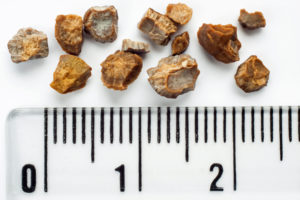Common kidney stone types
There are many different types of kidney stones. These stones form based on a multitude of contributing factors including a genetic predisposition, dehydration, dietary and lifestyle choices, medications, infections, and certain metabolic diseases.
Stones are generally silent until they begin to move. Once they move, they can cause agonizing pain and other bothersome symptoms. Kidney stone symptoms can vary based on the type, size, and location of the stone. Common symptom include extreme pain, blood in the urine (hematuria), frequent urination, foul-smelling urine, difficulty urinating, fever or chills – particularly if an infection is present.
Types of kidney stones
In simple terms, kidney stones are made from mineral deposits that clump together and build upon themselves. Stones can be as small as sand, and easily pass through the urinary system out of the body. They can also grown very large before attempting to move through the urinary tract. The treatment and removal of kidney stones will vary based on their size, number, location, and the symptoms they are producing. If they are causing a urinary blockage, they will need to be removed right away.
Calcium Stones
There are two basic types of calcium stones: calcium oxalate and calcium phosphate.
Calcium oxalate stones are the most common type of kidney stone and result from high levels of calcium oxalate in the urine. Oxalate is a ‘salt’ derivative of oxalic acid. Calcium oxalate is a combination of calcium and oxalate which, once joined, inhibits the absorption of calcium in the body and can form stones. Calcium oxalate is a substance found in many foods including spinach, rhubarb, and nuts. Consumption of calcium oxalate rich foods can also promote stones growth.
Calcium phosphate stones are similar to calcium oxalate stones, except they are the combination of calcium and phosphoric acid. They are not as common as calcium oxalate stones.
Struvite Stones
As their name suggests, these stones are made up of struvite, a phosphate mineral (magnesium, ammonium, and phosphate). Struvite stones form as a result of an infection in the system. Because women are known to have more urinary tract infections, struvite stones are more common in women.
Uric Acid Stones
These stones result from high levels of uric acid in urine. They can result from high-protein or high-purine diets, gout, diabetes, and undergoing chemotherapy. Purine rich foods include some meats and fish, organ meats, shellfish, as well as some vegetables and grains.
Cystine Stones
These stones result when a person’s kidneys excrete too much of the amino acid cystine into the urine. This genetic condition is known as Cystinuria. As a result, this type of stone formation is rare compared to the other types.
If you are experiencing symptoms related to kidney stones, or have a family history of stones, contact Urology Austin to schedule an appointment. If kidney stone symptoms are severe and intolerable, proceed to an emergency room.

